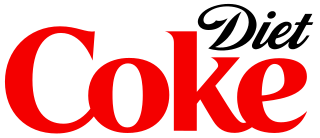
Coca-Cola, or Coke, is a carbonated soft drink manufactured by the Coca-Cola Company. Originally marketed as a temperance drink and intended as a patent medicine, it was invented in the late 19th century by John Stith Pemberton in Atlanta, Georgia. In 1888 Pemberton sold Coca-Cola's ownership rights to Asa Griggs Candler, a businessman, whose marketing tactics led Coca-Cola to its dominance of the global soft-drink market throughout the 20th and 21st century. The drink's name refers to two of its original ingredients: coca leaves, and kola nuts. The current formula of Coca-Cola remains a closely guarded trade secret; however, a variety of reported recipes and experimental recreations have been published. The secrecy around the formula has been used by Coca-Cola in its marketing as only a handful of anonymous employees know the formula. The drink has inspired imitators and created a whole classification of soft drink: colas.
Pepsi is a carbonated soft drink manufactured by PepsiCo. Originally created and developed in 1893 by Caleb Bradham and introduced as Brad's Drink, it was renamed as Pepsi-Cola in 1898, and then shortened to Pepsi in 1961.

Diet Coke, Coca-Cola Light, or Coca-Cola Light Taste, is a sugar-free and no-calorie soft drink produced and distributed by the Coca-Cola Company. It contains artificial sweeteners instead of sugar. Unveiled on July 8, 1982, and introduced in the United States on August 9, it was the first new brand since 1886 to use the Coca-Cola trademark. The product quickly overtook the company's existing diet cola, Tab, in sales.
In marketing, brand management begins with an analysis on how a brand is currently perceived in the market, proceeds to planning how the brand should be perceived if it is to achieve its objectives and continues with ensuring that the brand is perceived as planned and secures its objectives. Developing a good relationship with target markets is essential for brand management. Tangible elements of brand management include the product itself; its look, price, and packaging, etc. The intangible elements are the experiences that the target markets share with the brand, and also the relationships they have with the brand. A brand manager would oversee all aspects of the consumer's brand association as well as relationships with members of the supply chain.
The cola wars refer to the long-time rivalry between soft drink producers The Coca-Cola Company and PepsiCo, who have engaged in mutually-targeted marketing campaigns for the direct competition between each company's product lines, especially their flagship colas, Coca-Cola and Pepsi. Beginning in the late 1970s and into the 1980s, the competition escalated, which gave this cultural phenomenon its current moniker of cola wars.

The Coca-Cola Company is a multinational beverage corporation incorporated under Delaware's General Corporation Law and headquartered in Atlanta, Georgia. The Coca-Cola Company has interests in the manufacturing, retailing, and marketing of non-alcoholic beverage concentrates and syrups, and alcoholic beverages. The company produces Coca-Cola, the sugary drink it is best known for, invented in 1886 by pharmacist John Stith Pemberton. At the time, the product was made with coca leaves, which added an amount of cocaine to the drink, and with kola nuts, which added caffeine, so that the coca and the kola together provided a stimulative effect. This stimulative effect is the reason the drink was sold to the public as a healthy "tonic", and the coca and the kola are also the source of the name of the product and of the company. In 1889, the formula and brand were sold for $2,300 to Asa Griggs Candler, who incorporated the Coca-Cola Company in Atlanta in 1892.

OK Soda was a soft drink created by The Coca-Cola Company in 1993 that courted the American Generation X demographic with unusual advertising tactics, including neo-noir design, chain letters and deliberately negative publicity. After the soda did not sell well in select test markets, it was officially declared out of production in 1995 before reaching nationwide distribution. The drink's slogan was "Things are going to be OK."

Coca-Cola Zero Sugar is a diet cola produced by The Coca-Cola Company. In some countries, it is sold as Coca-Cola No Sugar.

Jack and Coke is a highball cocktail made by mixing Jack Daniel's brand Tennessee whiskey with Coca-Cola. It is especially popular in the American South. The drink is generally served with ice – sometimes in an old-fashioned glass or a Collins glass, and sometimes in less-expensive containers such as disposable plastic cups. Bourbon and Coke, more generically bourbon and cola, is basically the same drink, except not identifying a particular brand of whiskey. The "Coke" part of the name may tend to imply that the Coca-Cola brand of cola is used, but it is common for any brand of cola to be referred to as "Coke", at least in the American South.
Tom Long is the son of Richard G Long and BettyLayne Hollinshead Long, was President and Chief Executive Officer of Miller Brewing Company and later CEO of MillerCoors, one of the world's largest brewers. He is now managing partner of Bridger Growth Partners in Atlanta, GA
The Pepsi Generation was the theme of an advertising campaign for Pepsi-Cola, a US brand of soft drink, that launched in 1963 as the result of a slogan contest. A new car was awarded to the writer of the winning slogan. The contest was the brainchild of Alan Pottasch, a PepsiCo advertising executive, and it was won by Appleton, Wisconsin resident, Ellen M. Reimer. Her slogan invited consumers to "Come Alive! You're the Pepsi Generation!" The original "Come Alive" jingle was performed by singer Joanie Sommers in her memorable "breathy" vocal style.
Mark Fitzloff is an American advertising creative director and the founder of the Opinionated advertising agency. He is most known for his work at Wieden+Kennedy on Nike and Coca-Cola, and for reviving Procter & Gamble's Old Spice brand. He is also the executive producer and screenwriter of Tempbot, Neill Blomkamp's cult short film.
Digital branding is a brand management technique that uses a combination of internet branding and digital marketing to develop a brand over a range of digital venues, including internet-based relationships, device-based applications or media content.
Also known as guerrilla marketing or ambush marketing, attack marketing is a form of marketing that incorporates a series of creative and strategic techniques used to build and maintain public awareness surrounding a person, place, product, or event. Attack marketing utilizes the power of social interactions to execute non-traditional marketing campaigns that drive sales, increase name awareness and create long-term buzz around a specific business. Attack marketing is used by many marketing, advertising, public relations and promotional event marketing agencies to promote popular worldwide brands and events. Attack marketing can be tailored to fit marketing programs of all budgets, small and large.
Richard Laermer is the author of eight books and CEO of RLM Public Relations, a PR firm he founded in 1991. He lived in New York, Connecticut, and La Quinta, California.
McCann, formerly McCann Erickson, is an American global advertising agency network, with offices in 120 countries. McCann is part of McCann Worldgroup, along with several other agencies, including direct digital marketing agency MRM//McCann, experiential marketing agency Momentum Worldwide, healthcare marketing group McCann Health, branding firm FutureBrand, and public-relations and strategic-communications agency Weber Shandwick.

Joseph Alden Reiman is an American advertising businessman and author.
Marcio Moreira was a multi-cultural marketing executive who played an influential role in the globalization of advertising. In a 44-year career at McCann Erickson Worldwide, Moreira headed the agency's InterNational Team—referred to by The New York Times as a "daring experiment in the nascent science of worldwide marketing"—customizing global campaigns to address cultural nuances on a country-by-country basis. Moreira has been credited with accelerating the cross-border, or trans-nationalization, of brands.
Global advertising or international advertising consists of collecting, processing, analyzing and interpreting information. There are two main purposes of international advertising research: (1) to assist business executives to make profitable international advertising decisions for their specific products and services and (2) to contribute to general knowledge of international advertising that is potentially useful to a variety of business executives, educators, government policy makers, advertising self-regulatory organizations and others interested in understanding the process and effects international advertising.
Jonathan Mildenhall is chief executive officer of TwentyFirstCenturyBrand, a marketing consultancy firm. While working for Airbnb in 2017, he was ranked 8th on the world’s most influential CMOs by Forbes.






